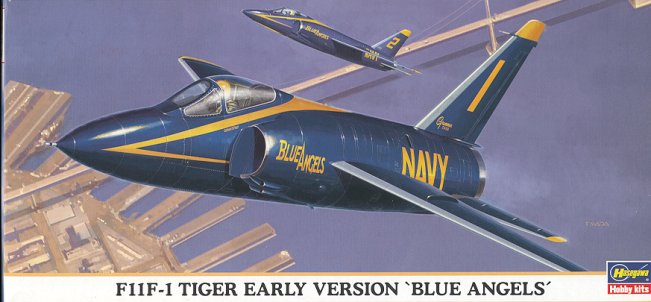
| KIT: | Hasegawa 1/72 F11F-1 'Early Version' |
| KIT # | 00170 |
| PRICE: | $ |
| DECALS: | Any Blue Angels bird |
| REVIEW & | |
| NOTES: | resin nose |

| HISTORY |
Grumman's F11F-1 was the Navy's first fighter capable ofsupersonic flight without having to do it while diving. There are stories aboutthe aircraft being so fast that one was shot down by its own bullets! A muchimproved F11F-1F was able to go mach 2, however, it was not chosen forproduction as the Navy had already picked the F8U-1 Crusader. The F11F-1 had arather short career in the Navy only being used in operational squadrons forfour years being phased out of carrier units in 1961. This marked the first timesince 1933 that there were no Grumman fighters on board carriers. This was toremain as such until the mid 1970s when the F-14 Tomcat was deployed aboard theUSS Enterprise with VF-1 and VF-2.
The TIger was very much a pilot's aircraft, and because of thatit was chosen to replace the F9F as the mount for the Blue Angels in 1957.Initially the early F11F-1 with the shorter nose was used as these planes werequickly replaced in fleet squadrons by the longer nosed variety (VA-156 was theonly fleet unit to use the short-nosed Tiger). As more of the later versionswere made available, so the shorter nosed Tigers were retired or used bynon-fleet units. The F11F (redesignated F-11A in 1962) was used as a Blue Angelsmount until 1969 when replaced by the F-4 Phantom II.
| THE KIT |

To those of us who have been building model plane kits forseveral years, the Hasegawa Tiger is an old friend. Still the best F11F in anyscale, this old warrior has been boxed as a Blue Angles plane a number of times.In fact, the standard boxing of the kit includes Blue Angel markings. Hasegawahas chosen to mold this particular kit in blue (apparently thinking we won'tneed to paint it), but is no different from the 'normal' boxing.......except forone thing. This kit includes a new resin nose.
Asfor the standard kit, you get a basic cockpit with seat, stick and instrumentpanel. The instruments on the panel and side console being provided in decalform. If you want a better cockpit, then Airwaves makes a set for this kit.There is a two piece canopy so you can display it in the open position shouldyou wish. Underwing stores consist of four sidewinders and two fuel tanks. Youcan either do all four positions carrying missiles or replace two of those withfuel tanks. For a Blue Angels aircraft, the holes in the underside of the wingwill have to be filled as no weapons were carried. The guns were removed fromBlue Angel aircraft as well, but the opening remained. Overall, the kit will bea pleasant build and with the new short nose, you'll have a variant that was notavailable in 1/72 before. Review kit courtesy of MarcoPolo Importers. Thanks for your support. If you would like your product reviewed fairly and quickly by asite that averages over 2,600 visits a day, please contactme or see other details in the  Instructionsare all we have come to expect from Hasegawa over the years. You get thestandard instruction sheet, but, as with all 'special' boxings that Hasegawadoes, there is an addendum sheet that pertains to the variant being kitted. Onthis sheet is the color guide, a diagram on how to cut and install the new nose,and another showing how to remove the small wing leading edge extensions thatwere not present on the short-nosed F11F-1. Naturally the plane is in overallBlue Angel Blue with polished leading edges to the flying surfaces as well asintakes and exhaust cone. You can build any one of the 6 planes and number/bunomatchings are given. The decals are standard Hasegawa and should work quitewell, even on the dark blue background.
Instructionsare all we have come to expect from Hasegawa over the years. You get thestandard instruction sheet, but, as with all 'special' boxings that Hasegawadoes, there is an addendum sheet that pertains to the variant being kitted. Onthis sheet is the color guide, a diagram on how to cut and install the new nose,and another showing how to remove the small wing leading edge extensions thatwere not present on the short-nosed F11F-1. Naturally the plane is in overallBlue Angel Blue with polished leading edges to the flying surfaces as well asintakes and exhaust cone. You can build any one of the 6 planes and number/bunomatchings are given. The decals are standard Hasegawa and should work quitewell, even on the dark blue background.